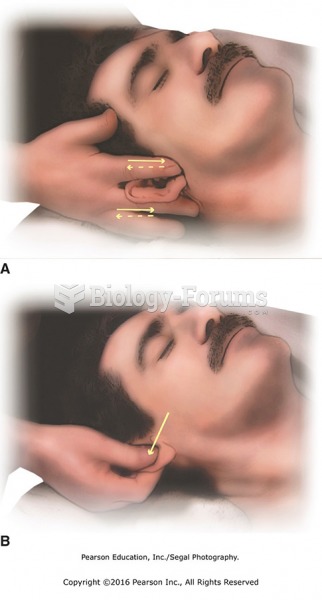Answer to Question 1
Correct Answer: 4
Rationale 1: Otitis interna, or labyrinthitis, can result from chronic otitis media and other types of infection. It is unlikely that this 5-month-old infant has this disorder.
Rationale 2: Mastoiditis is a bone infection that results from untreated or undertreated otitis media infections. There is no evidence that the infant has this disorder.
Rationale 3: External otitis, or swimmer's ear, is usually treated with a strong alcohol solution, a topical antifungal, corticosteroids, or antibiotics. It is unlikely that this infant has external otitis.
Rationale 4: Most children will have an episode of acute otitis media by age 3. It is most likely that this infant has an otitis media infection, and at this age will be given antibiotics and analgesics.
Global Rationale: Most children will have an episode of acute otitis media by age 3. Pulling on the ear is a classic symptom. It is most likely that this infant has an otitis media infection, and at this age will be given antibiotics and analgesics. Otitis interna, or labyrinthitis, can result from chronic otitis media and other types of infection. It is unlikely that this 5-month-old infant has this disorder. Mastoiditis is a bone infection that results from untreated or undertreated otitis media infections. There is no evidence that the infant has this disorder. External otitis, or swimmer's ear, is usually treated with a strong alcohol solution, a topical antifungal, corticosteroids, or antibiotics. It is unlikely that this infant has external otitis.
Answer to Question 2
Correct Answer: 1,2,5
Rationale 1: Cerumenolytics used prior to irrigation can loosen and help remove impacted cerumen from the ear.
Rationale 2: Solutions placed in the ear should be warmed prior to instillation to prevent the client from experiencing dizziness.
Rationale 3: The risk of cerumen impaction increases with the use of cotton-tipped applicators.
Rationale 4: Ear irrigations should be done with gentle pressure.
Rationale 5: The pinna of adults should be gently pulled up and back prior to instilling ear medications.
Global Rationale: Cerumenolytics used prior to irrigation can loosen and help remove impacted cerumen from the ear. Solutions placed in the ear should be warmed prior to instillation to prevent the client from experiencing dizziness. The pinna of adults should be gently pulled up and back prior to instilling ear medications. The risk of cerumen impaction increases with the use of cotton-tipped applicators. Ear irrigations should be done with gentle pressure.







